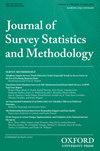Bootstrap Estimation of the Conditional Bias for Measuring Influence in Complex Surveys
IF 1.6
4区 数学
Q2 SOCIAL SCIENCES, MATHEMATICAL METHODS
引用次数: 0
Abstract
In sample surveys that collect information on skewed variables, it is often desirable to assess the influence of sample units on the sampling error of survey-weighted estimators of finite population parameters. The conditional bias is an attractive measure of influence that accounts for the sampling design and the estimation method. It is defined as the design expectation of the sampling error conditional on a given unit being selected in the sample. The estimation of the conditional bias is relatively straightforward for simple sampling designs and estimators. However, for complex designs or complex estimators, it may be tedious to derive an explicit expression for the conditional bias. In those complex surveys, variance estimation is often achieved through replication methods such as the bootstrap. Bootstrap methods of variance estimation are typically implemented by producing a set of bootstrap weights that is provided to users along with the survey data. In this article, we show how to use these bootstrap weights to obtain an estimator of the conditional bias. Our bootstrap estimator is evaluated in a simulation study and illustrated using data from the Canadian Survey of Household Spending.复杂调查中测量影响的条件偏差的Bootstrap估计
在收集偏斜变量信息的抽样调查中,通常需要评估样本单位对有限总体参数的调查加权估计量的抽样误差的影响。条件偏差是一种有吸引力的影响度量,它解释了抽样设计和估计方法。它被定义为采样误差的设计预期,条件是在样本中选择给定的单元。对于简单的采样设计和估计器,条件偏差的估计是相对直接的。然而,对于复杂的设计或复杂的估计量,推导条件偏差的显式表达式可能是乏味的。在这些复杂的调查中,方差估计通常通过bootstrap等复制方法来实现。方差估计的Bootstrap方法通常通过产生一组Bootstrap权重来实现,该权重与调查数据一起提供给用户。在这篇文章中,我们展示了如何使用这些自举权重来获得条件偏差的估计量。我们的bootstrap估计器在一项模拟研究中进行了评估,并使用加拿大家庭支出调查的数据进行了说明。
本文章由计算机程序翻译,如有差异,请以英文原文为准。
求助全文
约1分钟内获得全文
求助全文
来源期刊
CiteScore
4.30
自引率
9.50%
发文量
40
期刊介绍:
The Journal of Survey Statistics and Methodology, sponsored by AAPOR and the American Statistical Association, began publishing in 2013. Its objective is to publish cutting edge scholarly articles on statistical and methodological issues for sample surveys, censuses, administrative record systems, and other related data. It aims to be the flagship journal for research on survey statistics and methodology. Topics of interest include survey sample design, statistical inference, nonresponse, measurement error, the effects of modes of data collection, paradata and responsive survey design, combining data from multiple sources, record linkage, disclosure limitation, and other issues in survey statistics and methodology. The journal publishes both theoretical and applied papers, provided the theory is motivated by an important applied problem and the applied papers report on research that contributes generalizable knowledge to the field. Review papers are also welcomed. Papers on a broad range of surveys are encouraged, including (but not limited to) surveys concerning business, economics, marketing research, social science, environment, epidemiology, biostatistics and official statistics. The journal has three sections. The Survey Statistics section presents papers on innovative sampling procedures, imputation, weighting, measures of uncertainty, small area inference, new methods of analysis, and other statistical issues related to surveys. The Survey Methodology section presents papers that focus on methodological research, including methodological experiments, methods of data collection and use of paradata. The Applications section contains papers involving innovative applications of methods and providing practical contributions and guidance, and/or significant new findings.

 求助内容:
求助内容: 应助结果提醒方式:
应助结果提醒方式:


